Introduction to Medicinal Plants
Medicinal plants are treasured for healing and cultural practices in many cultures, including India’s. They offer natural remedies for health problems and play a role in spiritual ceremonies, which can improve how people feel emotionally. Growing these plants at home allows individuals to manage their health on their own and feel closer to nature and their cultural roots. Today, growing these plants is also considered a way to help the environment and keep different types of plants and animals alive, proving how they are still important today.
Importance of Medicinal Plants in Indian Homes
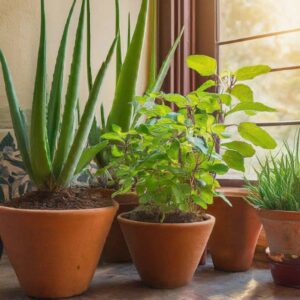
Medicinal plants are important in Indian homes for health and tradition. They treat ailments naturally, are part of rituals, and boost well-being. Growing them promotes sustainable living and connects to nature. Today, they also help conserve the environment and preserve biodiversity, benefiting health and culture in Indian families.
Discuss the cultural and health significance of growing medicinal plants at home
Growing medicinal plants at home is culturally important because they are part of traditions and rituals, making people feel spiritually connected and emotionally better. These plants symbolize heritage and community, helping people feel a strong cultural identity. For health, they offer natural ways to treat illnesses, letting people take care of their health on their own and use fewer synthetic medicines. Growing these plants also helps the environment by supporting different plants and animals. This practice combines old knowledge with new ways to stay healthy, showing how important medicinal plants are for culture and health.
Popular Medicinal Plants in India
India has many popular medicinal plants known for their healing powers. Tulsi, or holy basil, helps with breathing and digestion, and is also spiritually important. Neem fights bacteria, heals skin, and boosts immunity. Aloe Vera is grown for skin and digestive problems. Ashwagandha is used in Ayurvedic medicine to reduce stress and rejuvenate. Turmeric, used in cooking, reduces inflammation. These plants aren’t just for health—they also carry ancient wisdom and are important in Indian wellness.
Tulsi (Holy Basil)
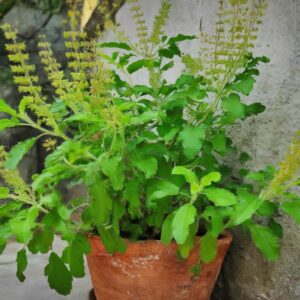
Tulsi, known as Holy Basil, is highly respected in India as the “Queen of Herbs”.It’s famous for helping with breathing and digestion and is significant spiritually. Tulsi reduces stress, boosts the immune system, and makes people healthier overall. It’s grown all across India and isn’t just used as medicine—it’s also a symbol of purity and positivity. People drink it as tea or use it in traditional remedies. Tulsi is vital in Ayurvedic medicine and a daily necessity for many in India.
Highlight the benefits and easy cultivation tips for Tulsi, a revered medicinal herb
Tulsi, known for its health benefits, helps with breathing and digestion, reduces stress, and strengthens immunity. Growing Tulsi is easy: plant seeds or seedlings in well-drained soil with lots of sunlight. Water regularly and trim occasionally to keep it healthy. It thrives in warm weather and can be grown in pots or gardens. Pick leaves when you want to make tea or medicine. Tulsi needs little attention but gives lots of leaves and smells good all year. Its easy growth and health perks make Tulsi loved in homes and gardens all over India and beyond.
Aloe Vera
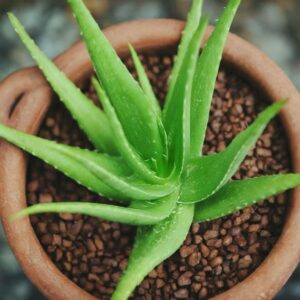
Aloe Vera is celebrated for its healing benefits, especially for soothing skin irritations and sunburns while moisturizing dry skin. Its gel is packed with antioxidants and vitamins that help repair skin and fight aging. Aloe Vera grows well indoors or outdoors in sunny spots with good drainage. It needs regular watering and basic care to thrive. Harvest its leaves close to the base to get fresh gel for skincare or other uses. People have valued Aloe Vera for centuries for its natural healing abilities, making it a popular choice for simple and effective home remedies.
Benefits of Aloe Vera for Skin and Health
Aloe Vera is good for skin and health. It moisturizes skin, easing sunburns, irritations, and dryness. Its gel has antioxidants and vitamins that heal skin and fight aging. Aloe Vera helps digestion, boosts immunity, and reduces inflammation for overall health. It grows easily at home in sunny spots with good soil drainage and needs little care. Harvest its leaves for fresh gel easily for skincare. Aloe Vera’s natural benefits make it a popular remedy for healthy, happy skin.
Explore how to grow and use Aloe Vera for its medicinal properties
Growing Aloe Vera for its healing benefits is easy. Plant it in sunny, well-drained soil indoors or outdoors. Water it sometimes and trim it to keep it healthy. Cut leaves near the base to get gel that helps sunburns and dry skin. The gel has good things like antioxidants and vitamins that heal cuts and reduce swelling. Drinking Aloe Vera juice helps digestion, boosts immunity, and keeps you healthy. It’s easy to grow and helpful for many home treatments because it works well for lots of health problems.
Neem
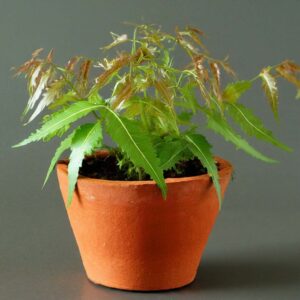
Neem is known as “Nature’s Pharmacy” for its many health benefits. It helps with skin problems and overall health. Neem leaves, bark, and oil have strong antibacterial, antiviral, and antifungal properties. People use it in traditional medicine for acne, eczema, and inflammation. Neem oil is also good for getting rid of pests and parasites, acting like a natural pesticide. It grows well in hot places with good soil drainage and doesn’t need much care. Neem is important for health and farming because it’s natural and helps sustain a healthy environment.
Uses of Neem Leaves and Bark in Ayurveda
In Ayurveda, Neem leaves and bark are valued for healing. Neem leaves treat skin problems like acne and eczema because they kill germs. They also clean the blood and help the liver. Neem bark is used to treat fever, stomach issues, and dental problems. People make teas, powders, or pastes from both for medicine. They help detoxify, boost immunity, and keep you healthy. Neem is important in Ayurveda for its natural healing, supporting overall well-being through traditional methods.
Detail the various health benefits and growing conditions for Neem trees
Neem oil is a natural pesticide. The tree’s properties support health and boost immunity. Neem trees grow best in hot climates with well-drained soil. They need little care and thrive in full sunlight. Regular watering during dry periods helps them grow well. Neem trees are valued for their medicine and environmental benefits, making them a good addition to gardens and farms.

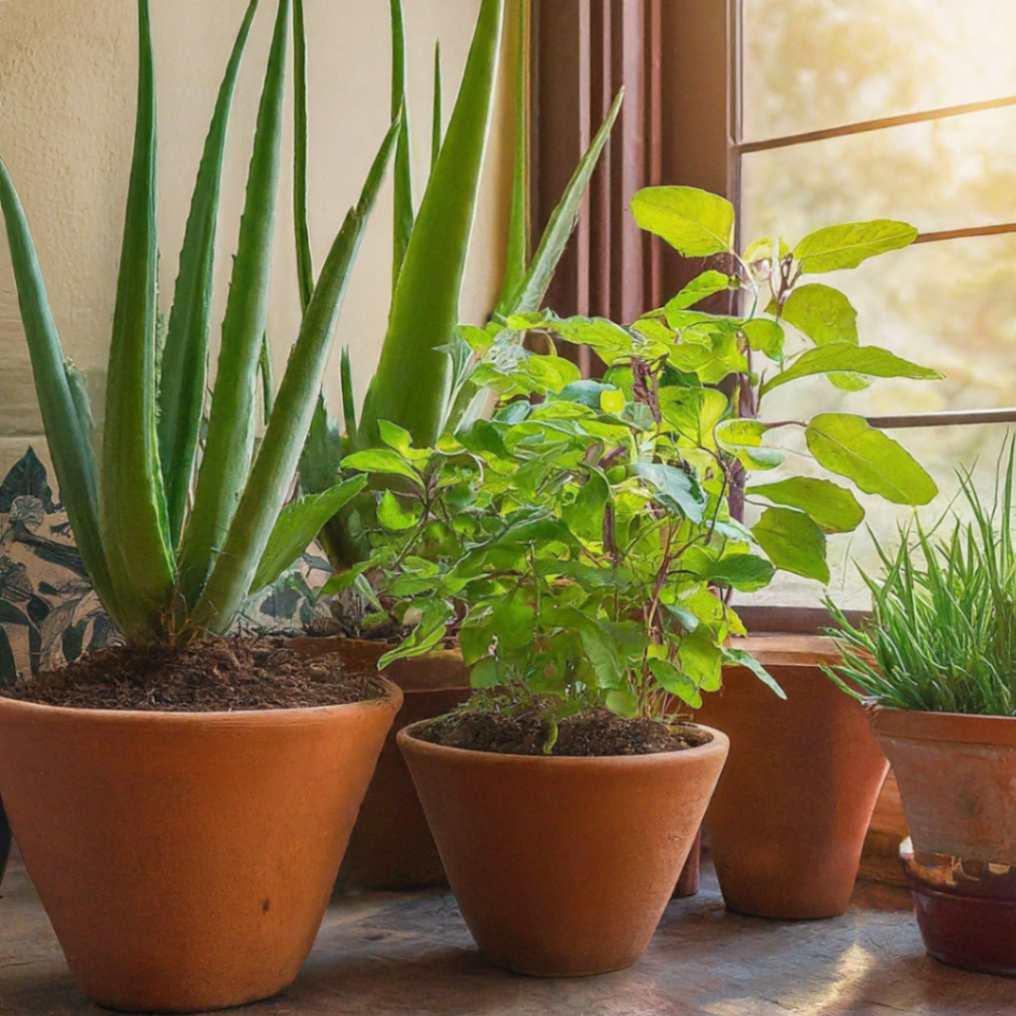




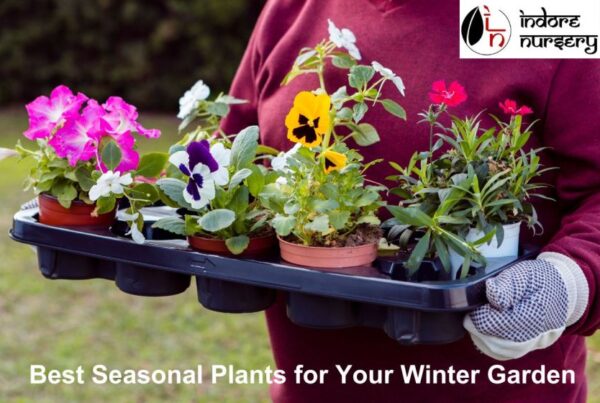


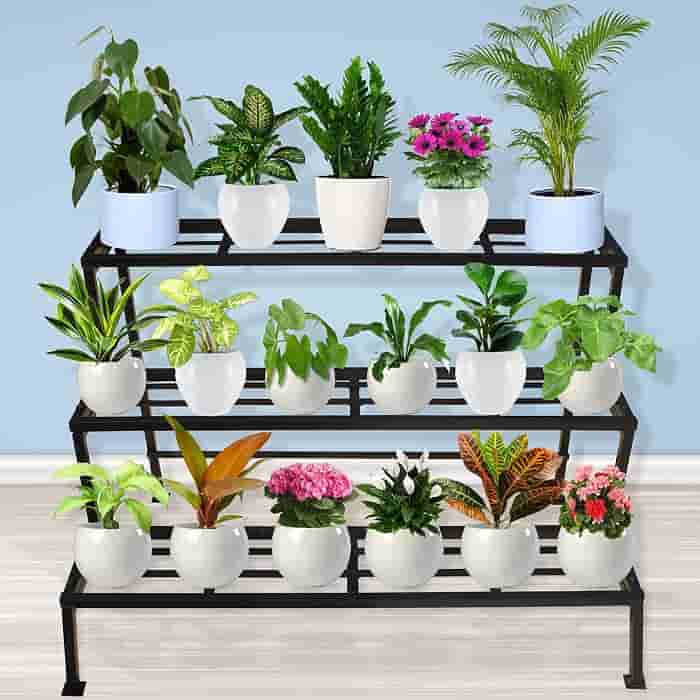
Recent Comments